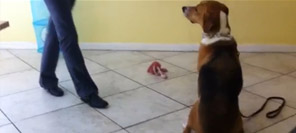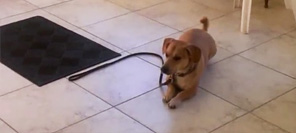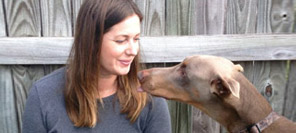Hi St. Pete dog and puppy owners! Looking for dog training tips? This blog’s for you! I want to share with you some basic dog obedience concepts that new puppy owners can utilize each and every day to help set clear boundaries and train good manners. I work with several new puppy/owner teams every week and the training tips I’m sharing here are based on first hand experience with the hundreds of students I’ve worked with as a professional dog trainer in the St. Petersburg, FL area since 2007.
What most new dog owners are seeking when they call me for dog training help, is a better understanding of how to respond in general to their dog’s behavior in a way that will encourage good manners while setting clear boundaries. Formal obedience commands are a very important part of that but it seems the greater challenge for most new dog and puppy owners lies in understanding how subtle behavior conditioning takes place between dog and owner each minute, hour and day and how to shape that conditioning properly. Daily behavior conditioning is what we want to concentrate on first when bringing a new dog home.
Dogs are loving, wonderful, affectionate, bright and loyal companions who are also opportunistic and resource DRIVEN ( resources are food, affection, sleeping space, water, potty spots etc. ). Use resources to your advantage when working with your new dog!
My advice to new dog owners is to try to pay close attention to how you interact with your dog. For at least the first six months of dog ownership while boundaries both in and outside of the home are being set, try very hard to think of the exchanges between you and your dog from your dog’s perspective. For example… if your dog jumps up on your lap or legs for affection and he/she is rewarded with pleasing touch or ANY verbal response 7 out of the 10 times he/she jumps up each day, then jumping up is the behavior he/she learns to repeat due to predictable reinforcement. If instead, your dog is given a brief time out, a correction or even ignored each time he jumps up and then receives affection and praise after he sits back down politely ( for at least 3-5 seconds ), sitting politely for affection is the behavior most likely to be repeated. Why complicate things? Its’ generally that simple. Don’t expect your dog to interpret your mood from day to day in terms of what behaviors you allow and then you don’t. Be as consistent as possible.
Another example… a rescue dog comes home to his new home to find it decked out with a doggy door, unlimited food left out all day, a basket on the floor filled with toys, access to all parts of house, bed and furniture… the new owner does not understand why their new dog may be very sweet but doesn’t listen AT ALL. Well that dog probably likes the new environment a lot. He probably LOVES the new found freedom and access to resources. He also doesn’t need his new humans for much of anything in terms of resources… therefore he doesn’t really feel any urgency to offer attention… therefore he has no real urgency to respond to commands or requests given by the owner. What would the dog be working for, what would he be earning in return for prompt obedience, the dog already has access to everything!
Don’t give your dog unlimited, unsupervised access to his/her cherished resources if you want respect and attention in return. Use resources as tools for training and teaching mutual respect.
Simplify things for yourself and your new dog. Ask him to follow you physically each day. Keep him on leash and close by at first. Ask him to work for the things he wants each day. Ignore or correct rude behavior each time. Reward good behavior each time. Use time outs effectively ( no more than a minute at a time). It really can be that simple.
While you are trying to set household boundaries and training routines for your new dog, use the things that your dog desires as tools to create polite habits based on working for rewards as opposed to demanding them. For example, if you allow your dog on the couch with you make sure you insist on a sit and some eye contact before YOU invite him up. Apply this quick ritual before offering other special rewards throughout your day.
Try to be very aware of what you are correcting and rewarding throughout the day since these exchanges are teaching your new dog about what is acceptable to you. Remember that rewarding patterns of good behavior each day is just as important as correcting unwanted actions. In fact, it’s very important that when you do correct an unwanted behavior, you follow up immediately by asking for a desired behavior and then reward it. That’s how you create a productive cycle of learning.
These concepts are tied in to the NILIF ( Nothing in life is free) protocol. There is lots of good info about that topic online if you search for it.
Sarah





